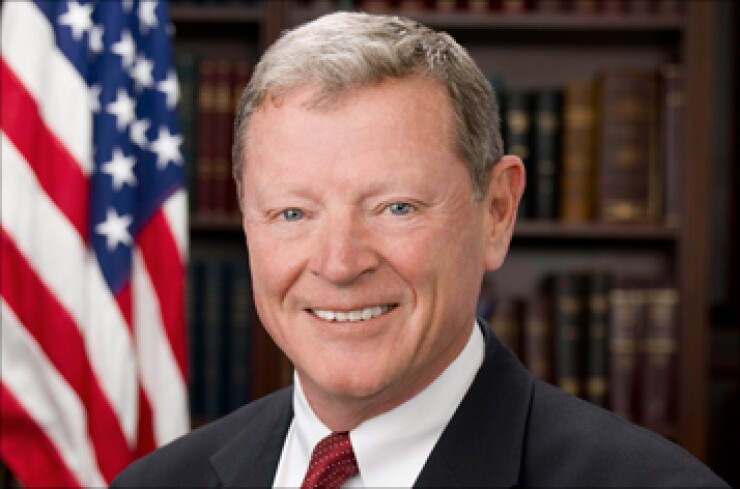
DALLAS — A five- to six-year transportation bill with increased federal funding for state projects is a top priority of the new chairman of the Senate Environment and Public Works Committee. Sen. James Inhofe, the Oklahoma Republican this week replaced Sen. Barbara Boxer, D-Calif., as chairman of the panel, which is primarily responsible for developing the Senate's version of the next transportation infrastructure spending measure.
"We want a long-term transportation bill, a sizable and a robust one," he said on Wednesday.
An increase in the federal tax on gasoline, the price of which has dramatically fallen in recent weeks, is one of several options for more transportation funding in the new multiyear highway bill, Inhofe said. Congress has not raised the gasoline tax of 18.4 cents per gallon since 1993.
In a possible effort to avoid complaints from fellow Republicans about a tax increase, Inhofe said the gasoline tax is actually a user fee because the motorists who pay for it directly benefit from the highway and transit projects funded by the revenue.
"It's not a tax. It's a user fee," he said. "A user fee is different from taxes."
An increase in the gasoline tax would not be as onerous as a carbon tax on utilities that would be passed along to all electric consumers, said Inhofe.
"If you had an increase of a few cents in terms of a user fee, that's not quite like having an increase, a doubling, in the cost of energy," he said.
House Minority Leader Nancy Pelosi, D-Calif., said Thursday that the drop in energy prices is an opportunity for Congress to raise the tax.
"If there's ever going to be an opportunity to raise the gas tax, the time when gas prices are so low, oil prices are so low, is the time to do it," Pelosi said at a press briefing.
Revenue from a gas tax increase should be dedicated to transportation, she said, not to offset a reduction in the income tax as some Republicans lawmakers have proposed.
"What I would be interested in seeing is something serious, not something show-biz, which would be how do you relate the gas tax to the Highway Trust Fund," Pelosi said. Meanwhile, Boxer, who announced Thursday that she will not seek reelection in 2016, said she favors funding transportation with a tax on crude oil at the refinery rather than a gasoline tax increase.
The new Congress should concentrate on passing a transportation bill by the end of May rather than being diverted by controversial legislation allowing construction of the Keystone Pipeline, she said.
"Republican leadership should immediately take up the highway bill, which supports millions of jobs and will run out of funding in four short months," Boxer said.
Boxer's looming retirement is unlikely to affect the transportation funding debate, said Drew Preston, a transportation spokesman for the U.S. Chamber of Commerce.
"We're losing a tireless champion for transportation infrastructure and it's always a blow to lose someone like that," Preston said.
"Congress has some been dealing with some of these problems for years and they still have to be addressed," he said. "Sen. Boxer has always been willing to reach across the aisle to find a compromise and that's what is needed."
Two other Republican chairmen of key Senate committees have mentioned a higher gasoline tax as a funding option for a new transportation bill.
Sen. Orrin Hatch, R-Utah, new chairman of the Senate Finance Committee said the gasoline tax will be considered.
"I'm looking at everything, every possible way of taking care of the highway bill," Hatch said.
A higher gasoline tax is on the table, said Sen. John Thune, R-S.D., chairman of the Senate Commerce Committee.
"I don't favor increasing any tax, but I think we have to look at all the options," Thune said Jan. 4 on Fox News. "The highway bill expires at the end of May and there's about a $100 billion shortfall of what it would take to fund the Highway Trust Fund at the current level of operation."
President Obama does not support an increase in the gasoline tax but is willing to listen to proponents, White House press secretary Josh Earnest said at a Jan. 5 press briefing.
"We don't believe that's the best way to fund modernizing our infrastructure is to raise the gas tax, but some people do," he said. "And we're willing to consider those proposals."
The president's preference is to fund transportation with corporate tax reforms that close "loopholes that only benefit the wealthy and well-connected corporations," Earnest said.
Gasoline and diesel tax revenues dedicated to the Highway Trust Fund are expected by the Congressional Budget Office to fall short of annual expenditures by about $16 billion a year over the next six years at current levels.
The current short-term extension of the HTF will expire May 31. The patch adopted by Congress in late July required a transfer of $11 billion in to the fund to keep money flowing to the states beyond a looming September 2014 reimbursement slowdown.





